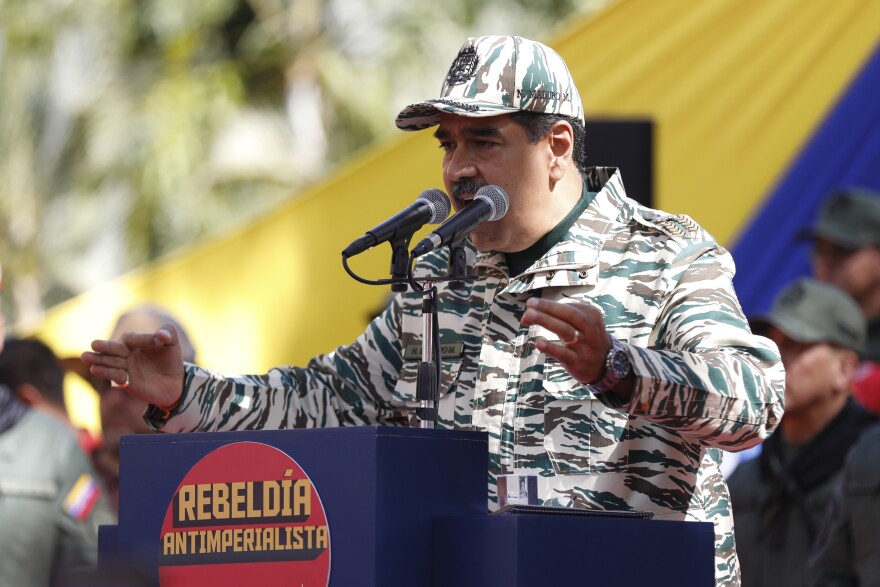Venezuela President Nicolás Maduro’s regime is growing “more fierce” in protecting its power and the decade-long exodus of Venezuelans will likely intensify following upcoming July elections, says Beatriz Olavarria, a longtime Venezuelan exile activist in South Florida.
“I think the regime has gotten much more fierce,” Olavarria told WLRN South Florida Roundup host Tim Padgett on Friday during an interview. “They have come up with laws to quiet everybody — fascist laws.”
She also predicted that the flood of outmigration of Venezuelans seeking refuge in nearby foreign countries, including the U.S., is all but certain to grow larger in the aftermath of the elections, in which Maduro is expected to win and remain in power.
“The ginormous migration that will probably come out if these elections don't go the way they should go,” said Olavarria.
The UN Refugee Agency estimates that 7.7 million Venezuelans — about 20% of the population — have left the country since 2014, representing the largest exodus in Latin America’s recent history.
Recent polls show that, if given half a chance, Venezuelans would overwhelmingly vote to boot Maduro from office.
Maduro has erected more voting barriers to Venezuelans in the U.S. and other countries to vote in July, according to Olavarria.
Indeed, millions of Venezuelan emigrants may not be able to cast a ballot because of costly and time-consuming government prerequisites to vote from abroad. One requirement: They must be properly registered with their foreign address and cannot be living in their host country illegally or seeking refugee or asylum status there. Another requirement is that they must have a valid Venezuelan passport, which can take months to process.
Previously, said Olavarria, who has helped Venezuelans in South Florida to vote, a utility or cellphone bill was all that was required for proof or residence.
Opposition rallies around González
On Friday, Venezuela's opposition rallied behind an unknown former diplomat to challenge Maduro in this summer's presidential election, the latest gambit to unseat the self-declared socialist.
All 10 parties in the chief opposition coalition announced they would back Edmundo González to be their candidate on the July ballot. Within hours, a catchy campaign jingle set to salsa music started circulating on social media declaring “Todo el mundo con Edmundo” — “The entire world with Edmundo.”
READ MORE: Venezuela’s main opposition bloc agrees on candidate to challenge Maduro in presidential election
The surprise show of unity, however, adds to mounting international pressure on Maduro and his allies to allow Venezuelans a free and fair vote to decide who they want to lead the oil-rich South American nation for the next six years.
Numerous obstacles remain to González's candidacy. Chief among them is a legal challenge, now with the Maduro-stacked Supreme Court, seeking to strike his party's ticket from the ballot altogether.
González is the third presidential candidate selected by the Democratic Unity Platform in the the past month after former lawmaker Maria Corina Machado, who easily won an opposition primary last year, and her handpicked alternative were both banned from registering.
The opposition bloc was allowed to provisionally register González on March 26 after the government came under a wave of criticism when opposition leaders said they were blocked from registering their candidate of choice.
Olavarria said the slate of opposition candidates do not represent a serious threat to the regime.
Maduro’s administration has cracked down on the opposition during the run-up to the July 28 presidential election despite promises to pave the way to fair elections in exchange for sanctions relief.
The Biden administration on Wednesday re-imposed crushing oil sanctions, criticizing Maduro’s moves.
Olavarria told WLRN that the administration had little choice but to reimpose sanctions but she’s hardly optimistic it will result in any changes to the Maduro regime.
“Let’s be patient, okay,” said Olavarrias. “Hopefully [the sanctions] work, [but] I don't think so.”
READ MORE: Tightening U.S. sanctions screws won't loosen Venezuela regime screws
The Associated Press contributed to this story.








